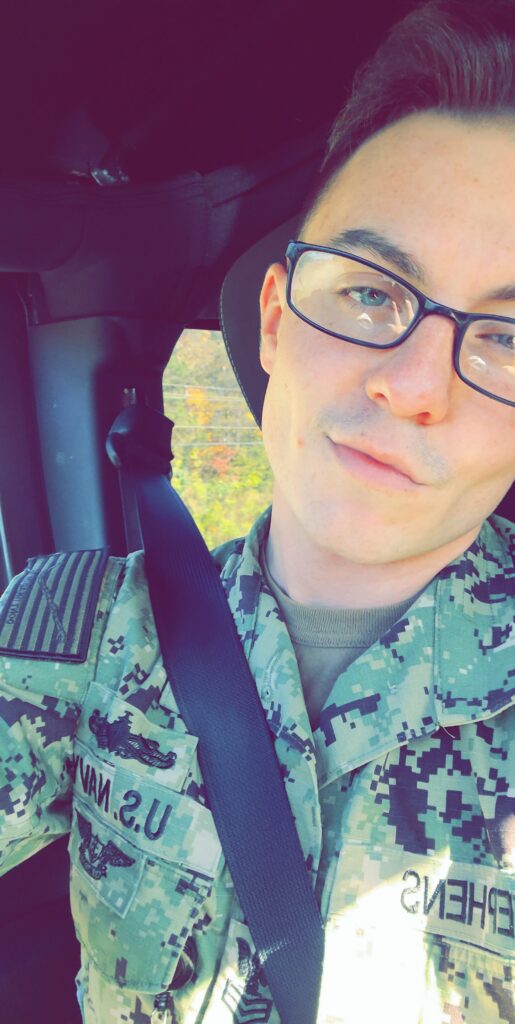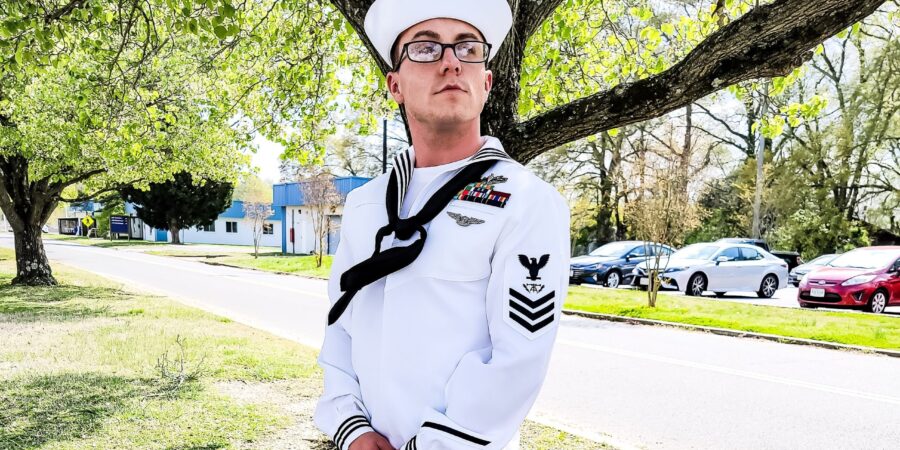This post originally appeared on Modern Military Association of America’s blog, where I wrote it as part of a series for Pride Month.
Dustin Stephens was born and raised in Johnstown, Pennsylvania, where he had very little exposure to LGBTQ people. He experienced confusion growing up as he found himself attracted to both boys and girls, not knowing that being bisexual was a a possibility.
Stephens enlisted in the Navy at age 18, and a year later he finally understood his sexual orientation and came out as bisexual. While he has found acceptance from many sailors, he’s also faced plenty of discrimination. Bisexual people are the largest population within the LGBTQ community, yet they are often the most misunderstood — especially bi men, who are frequently stigmatized or not believed. Stephens has worked hard to overcome bi-erasure and ignorant stereotypes, both in the military and the civilian world.
Despite the hurdles, Stephens has continued to have a successful career in the Navy. He has also bravely decided to use his experiences of discrimination as a way to educate his military colleagues on how to be more accepting of LGBTQ people. This is his story.
Emily Starbuck Gerson: First, can you tell us a little about your Navy career thus far?
Dustin Stephens: I joined the Navy directly out of high school at 18 into the “Advanced Computer Electronics Field” progressing to get rated as an Aegis Fire Controlman. I’ve been enlisted for eight years this July and am an E6. In my time I have studied in Great Lakes, Illinois; Dahlgren, Virginia; and was Stationed aboard the USS Jason Dunham (DDG-109) for five years that was homeported in Norfolk, Virginia.
Onboard the Jason Dunham, I was able to earn both my Enlisted Surface Warfare Specialist and Enlisted Aviation Warfare Specialist qualifications. While maintaining a heavy optempo countless underway periods, two seven-month deployments and two major shipyard periods, I had the pleasure of visiting 25 different countries and experiencing so much culture. I am now stationed back in Dahlgren, Virginia, working in the building where I was trained maintaining the equipment used to teach junior sailors to do my job.
ESG: When did you realize you were bi, and when did you come out? What has your experience been as an out bisexual male in the Navy?
DS: I first realized I was different in high school because I was very attracted to girls but began to notice my interest in boys as well. That in itself created a lot of confusion for me only having been with girls intimately, and growing up in a very closed-minded town where there was “no such thing” as a bisexual man. You were either gay or straight, which caused me to stay in the closet until I left.
It wasn’t until I was already in the Navy for over a year that I came to terms with the validity of bisexuality and came out at 19 years old. I am out in the Navy, and the majority of the experience has been positive at best or tolerant at least.
However, yes, I have faced blatant homophobia and flat-out bi-erasure. I have had sailors tell me that I’m just gay and scared to come out “the whole way.” I’ve had senior sailors tell me I am too feminine and need to embody a more manly persona to be taken seriously. And worst of all (in my opinion) was when someone tried to argue to me in a group setting that all LGBTQ+ people are pedophiles.

ESG: Bisexual women are often over-sexualized, while bisexual men are often stigmatized or not believed (like ‘they must really be gay’). Have you experienced this double standard, and what do you think is needed to help improve bi visibility and acceptance?
DS: Yes, bi-erasure of men and the over sexualization of women is rampant through the Navy as it is in the civilian world.
One of the biggest things I notice that can improve validity and visibility of bisexuality is helping people understand that whether a bi person is in an opposing sex or same-sex relationship, they are still bisexual. I don’t know how many times I hear “she used to be bi” or “he used to be straight.” It’s statements like that really do erase our sexual identity.
ESG: Those of us in the community know that diversity is a strength. How has your identity as an LGBTQ person, and living authentically, made you a better person and sailor?
DS: Personally I think being out and living authentically has allowed me to have more time to empathize and overall care about others, whether it’s my junior sailors or anyone really. Because that time I freed up is no longer wasted over-analyzing every interaction I have trying to be sure I don’t out myself by saying something a certain way or a mannerism.
I’ll circle back to the first question to close; I have used every example of discrimination I gave and many more as an educational opportunity and was able to bridge the gap between cis-hetero sailors and their LGBTQ+ counterparts, or at least start them in that direction. Honestly I think that has been one of the best parts of being out, proud, and vocal about my sexuality regardless of stigma.

